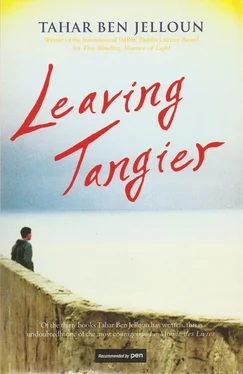Tahar Ben Jelloun - Leaving Tangier
Здесь есть возможность читать онлайн «Tahar Ben Jelloun - Leaving Tangier» весь текст электронной книги совершенно бесплатно (целиком полную версию без сокращений). В некоторых случаях можно слушать аудио, скачать через торрент в формате fb2 и присутствует краткое содержание. Год выпуска: 2009, Издательство: Arcadia Books, Жанр: Современная проза, на английском языке. Описание произведения, (предисловие) а так же отзывы посетителей доступны на портале библиотеки ЛибКат.
- Название:Leaving Tangier
- Автор:
- Издательство:Arcadia Books
- Жанр:
- Год:2009
- ISBN:нет данных
- Рейтинг книги:5 / 5. Голосов: 1
-
Избранное:Добавить в избранное
- Отзывы:
-
Ваша оценка:
- 100
- 1
- 2
- 3
- 4
- 5
Leaving Tangier: краткое содержание, описание и аннотация
Предлагаем к чтению аннотацию, описание, краткое содержание или предисловие (зависит от того, что написал сам автор книги «Leaving Tangier»). Если вы не нашли необходимую информацию о книге — напишите в комментариях, мы постараемся отыскать её.
Leaving Tangier — читать онлайн бесплатно полную книгу (весь текст) целиком
Ниже представлен текст книги, разбитый по страницам. Система сохранения места последней прочитанной страницы, позволяет с удобством читать онлайн бесплатно книгу «Leaving Tangier», без необходимости каждый раз заново искать на чём Вы остановились. Поставьте закладку, и сможете в любой момент перейти на страницу, на которой закончили чтение.
Интервал:
Закладка:
When several days passed without any sign of life from Azel, his police contact became annoyed and decided to visit him. The concierge claimed to have seen Azel the previous day with two men, ‘Moros,’ she added. The policeman rang and rang Azel’s bell, but no one came to the door. He called for reinforcements to break it down.
Azel was on the floor, his throat cut, his head in a pool of blood. The Brothers had slaughtered him like a lamb sacrificed for Aïd el-Kebir.
39 . Kenza
WAITING. Kenza had spent her life waiting. She had explored all the mysteries of boredom, because to wait is to dive into a sea of ennui. It’s like growing old, in other words — watching the future shut down, fade away, lose all promise. If she could have at least known what she was waiting for… Although Kenza had always managed to get through her life without too much fuss, her mother never stopped saying things like:
‘Tell me, how do others manage to do so well, finding a husband of good family, with fine financial prospects, a handsome, respectable man? Look at you: you are beautiful in every way, your studies enable you to work in a clinic, you’re from an honest and upright family — not rich, but not poor, either, so, tell me, what are you waiting for to meet a man? I’m waiting for you — every day I pray God that you meet someone, I pray and ask God to consider my condition, my age, and my hopes…’
Kenza had had enough of such admonitions. She was simply unlucky. She lacked the savoir-faire of her married girlfriends who preferred not to notice that their husbands were merrily cheating on them. At least they had a home.
Before leaving Morocco, Kenza had even dared take part one day in a programme about marriage on Radio Tangier. The moderator had gathered together four unmarried women between twenty-five and thirty-five years old, whom she introduced with the remark that after the age of twenty-five, it was time to get seriously worried. Kenza had just turned thirty and had lost her virginity years before. She wanted to defend the idea that a woman could be single and happy, free and honest, loved and respected. She was waiting not for a husband, but for love. She had an exalted idea of love, of the relationship between the sexes, especially in a beautiful country like her own, and although she knew that she was cherishing some illusions, she persisted in her ambition: to find love — true love, real and sincere, overwhelming love, and for once, just once, to experience those sublime moments described so tellingly in the films and novels she had adored. She remembered in particular The Alexandria Quartet , which her philosophy professor had given her; Gone with the Wind and The Lady of the Camellias had deeply moved her as well. It was through such works that she had formed a precise idea of what would make her deliriously happy. And it was also how she had realized that she would not find such a love in Morocco, not because Moroccan men were incapable of such emotion, but because daily life and public opinion would always stifle true love in the end.
She had learned much about Morocco in the hammam, the ideal place for sociologists, psychoanalysts, historians, novelists, and even poets. For it is there, as they bathe, that women talk. It is the greatest divan in the world, a collective space, like taxis, where everyone has the right to speak up, to confide, to complain. It is there that women have for centuries been shedding tears and sharing those truths that the outside world wishes to neither see nor hear. It was in this haven that Khadija the seamstress had dared tell how she had caught her husband abusing the little apprentice who worked in her home, a sweet and talented girl of thirteen. The husband was sneaking into her bed and entering her from behind to avoid taking her virginity, and to punish him for this crime, Khadija had deprived him of insulin for an entire day, which had almost driven him insane. It was in the hammam as well that Kenja had heard the story of Saadia, possessed by the jinns* that lived in her old house: as soon as she lighted a lamp, an invisible hand would snuff it out. Now Saadia was familiar with every marabout in the country and spoke of nothing but what the jinns had commanded her to do. It was also in the hammam that Kenza had learned of the miraculous recipe to restore full potency to a man; at least three women had attested to the marvellous change in their husbands after they’d taken this potion. And it was in the hammam that Kenza had heard that pregnant African women were choosing to make the dangerous clandestine crossing in hopes that the police would take pity on them if they were arrested, and let them give birth on Spanish soil.
She had ‘learned’ Morocco in the hammam the way one learns a language both foreign and familiar. Silences, for example, could be translated. Back home, women who kept silent did so not because they had nothing to say, but because few people were capable of listening to and understanding what they did have to say. Now Kenza paid attention to women who kept their own counsel. The raw language used by women among themselves had been a shocking revelation to her: they spoke openly about genitals and accompanied their words with obscene gestures, showing no modesty, as if they were all sharing at last in the power of complete freedom. If they could have lived their whole lives in the hammam, they would have done so. It would have become the land of women, where they would summon men, to consume them as they pleased, returning them afterwards to their humdrum lives laced, of necessity, with cowardice and compromises great and small, a social routine where appearances are naturally intended to mask everything else. Imagine an immense hammam as the City of Women, with veils of vapor in the semidarkness, so conducive to speaking freely and in confidence, and secret networks of cellars, taverns, trap doors, antechambers where sexuality would at last be free, unfettered by modesty or moral judgement. Women would gather there to reorganize the relationships of society, or at least those between men and women. That would be a nice little revolution! ‘Wife, where are you going?’ the husband would shout. ‘I’m off to the hammam to bathe, pluck my eyebrows, and perfume myself just for you, so that tonight I may be yours, to do with as you please!’ The husbands would complain, ‘Oh, the hammam again!’ — and have no idea how much they’d be missing: yes, you poor husbands, everything escapes you, but you’ll never have a clue, never learn what goes on there, where women are so fond of gathering among themselves for a few hours undisturbed by husbands or children. ‘A curse on this place from which men are banished!’ husbands would cry. ‘We men, when we go to the hammam, we don’t dawdle and linger there, we wash, all done, then it’s off to work.’
And that’s how Kenza went to school in the hammam of Marshan. Which hadn’t prevented her from spending the rest of her time waiting, waiting, and waiting some more. Then the angel Gabriel arrived: Miguel, the friend in need, bringing with him both order and disorder. Without meaning to, he would seriously damage the life of her family, but no one would ever reproach him for that. Unlike her brother, Kenza was grateful to Miguel. She did not hold him responsible for her self-destructive fantasies. She’d felt this burning wound inside her for a long time, well before the advent of Miguel: the wound of waiting, ennui, and a future whose mirror had shattered.
Kenza had dozed off peacefully. Light music was playing on the radio. As if in a dream she heard: ‘The king is dead; long live the king!’ Then a cry, followed by applause, and then: ‘Hassan II is now at rest; may his son be ever blessed!’ Images began tumbling through her mind: men and women clothed in white immersing themselves in a river, then going to pray in a vast prairie bathed in light. No one was weeping. Children were running in all directions yelling, ‘Long live the king!’
Читать дальшеИнтервал:
Закладка:
Похожие книги на «Leaving Tangier»
Представляем Вашему вниманию похожие книги на «Leaving Tangier» списком для выбора. Мы отобрали схожую по названию и смыслу литературу в надежде предоставить читателям больше вариантов отыскать новые, интересные, ещё непрочитанные произведения.
Обсуждение, отзывы о книге «Leaving Tangier» и просто собственные мнения читателей. Оставьте ваши комментарии, напишите, что Вы думаете о произведении, его смысле или главных героях. Укажите что конкретно понравилось, а что нет, и почему Вы так считаете.












